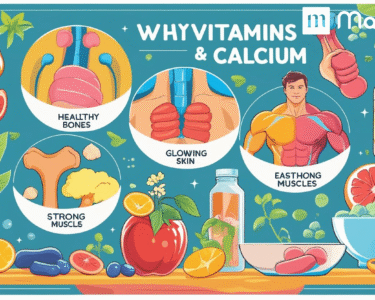Eggs are one of the most adaptable, reasonably priced, and high-protein foods consumed worldwide. There are so many delectable ways to incorporate eggs into your diet, whether you want them boiled, poached, scrambled, or in an omelet. However, eggs’ nutritional composition is what really sets them apart from other foods in terms of taste and convenience.
The nutritional advantages of eggs, their quality and protein content, and the most frequently asked question—how much to eat depending on age, gender, and dietary requirements—will all be covered in this blog.
Eggs Nutritional Benefits
Understanding why Eggs are superfood ?
Undoubtedly, eggs are a powerhouse of nutrients, which are packed in a small shell. We are taking an example of a single large egg, which weighs around 50g :
| Protein | 6 grams |
| Fat | 5 grams |
| Carbohydrates | Less than 1 g |
| Minerals | Iron, phosphorus, selenium, and zinc |
| Choline | Works brilliantly on liver health and brain development |
| Calories | ~70 |
| Cholesterol | ~186 mg |
| Vitamins | A, D, E, B2, B12, and folate. |
| Antioxidants | Zeaxanthin and lutein (important for eye health) |
Benefits of Eggs in Everyday Diet
Blessing for your Heart : Yes, unlike old myths, egg consumption in moderation does not raise any heart related risk. Eggs, on the contrary, provide essential healthy fats and antioxidants to our body and protect heart’s health.
Increase Bone Strength: Eggs contain lots of vitamin D and phosphorus for our body, which helps in increasing bone strength.
Protects the Eyes : The amount of Lutein and zeaxanthin present in eggs reduces the risk of cataracts and age related macular degeneration. It protects your eyes against several other diseases and infections.
Boost Brain Health: Eggs contain choline, which supports brain health, making it sharper. It also helps in the development of the brain and hence serves as the best food for children. This choline is abundantly found in egg yolk.
Manages Weight : Eggs are low in calories and can keep you full for a long time because of their high protein content in it.
Eggs : A Complete Protein Source
Protein is one of those essential parts of our diet which helps in muscle growth, hormone production, tissue repair, while strengthening our immune functioning as well. Eggs contain high-quality and complete protein, containing all 9 essential amino acids required by the body. Although the egg white is almost pure protein with minimal fat, the egg yolk contains fats, vitamins, and the rest of the protein. Together, we can state that eggs are a small packet of protein and nutrients.
Protein Content in Egg White vs Egg Yolk
| Egg Part | Protein (Approx) |
| Egg Yolk | 2.7 grams |
| Egg White | 3.6 grams |
| Whole Egg | 6.3 grams |
Egg Protein Digestibility and Bioavailability
Eggs have a special property of having a biological value of 100, which means that the body can utilize the protein extremely efficiently. Hence, eggs are an ideal choice for :
- Lactating women
- Children
- Teenagers in growth phases
- Pregnant
- Elderly people need to preserve muscle mass
- Athletes and bodybuilders.
Innovative Ways To Consume Eggs For Maximum Nutrition
| Poached Eggs | Utilizes no oil, hence extremely healthy for the heart |
| Boiled Eggs | It is low calorie and an ideal protein for weight watchers. |
| Eggs, Salads, or Sandwiches | It can be a quick and nutritious meal option |
| Egg Curry or Bhurji | It is an extremely spicy and satisfying meal option that can be balanced with other healthy ingredients |
| Omelets | Make yourself a yummy omelet by adding spinach, tomatoes, and onions for extra fiber and nutrients. |
| Scrambled Eggs | Add vegetables to make a tasty and healthy egg dish. |
How Many Eggs Should You Consume Per Day?
It’s a very common question about how many eggs you should consume per day for maximum benefits. Although the answer depends upon your age, health conditions, lifestyle, and dietary preference, here is a sorted chart which guides you through some general recommendations for suggested egg intake daily.
| Group | Suggested Daily Egg Intake |
| Adults (19-60 yrs) | 1-3 eggs per day |
| Children (1-12 yrs) | 1 egg per day |
| Teenagers (13-18 yrs) | 1-2 eggs per day |
| Pregnant or lactating women | 1 -2 eggs per day |
| Elderly (60 + yrs) | 1-2 eggs per day |
| Athletes/Gym Goers | 3-6 eggs per day (Varies according to dietary preferences) |
Myths and Facts About Eggs
Myth 1
Brown eggs are more nutritious as compared to white eggs
Fact
The color of the shell does not affect the nutrition of the eggs, and hence both the white and brown eggs are healthy.
Myth 2
Egg raises the cholesterol
Fact
You need to learn that moderation is the key, and hence consuming 1 to 2 eggs daily is safe for most people.
Myth 3
Egg whites are healthier than the yolks
Fact
Egg yolks are equally healthy as they contain vital nutrients like choline, vitamins and antioxidants.
Myth 4
Cooked eggs lose its nutrition
Fact
Cooking improves the digestibility of egg and reduces salmonella risk as well.
Some Smart Tips for Storing Eggs
- Eggs have a protective layer around them, hence if you want to store eggs for long, avoid washing them washing them.
- Eggs can contain some bacteria; therefore, it is always a good option to cook eggs until both the white and yolk are firm.
- To store eggs for long time, choose fresh eggs. You can check the freshness of the egg by putting it in a bowl of water.
- Always store eggs in the refrigerator at a consistent temperature.
Eggs: Small in Size, Big on Nutrition
Eggs are the ideal natural food since they are inexpensive, simple to prepare, and nutrient-dense. Including eggs in your daily diet can be a wise choice for improved health because of their nutritional advantages, the proteins they contain, and how to safely take them in amounts.
Eggs should be at the top of your plate whether you’re a student, working mom, fitness enthusiast, or just trying to eat healthier.






